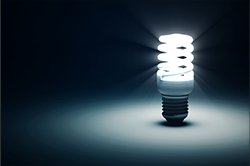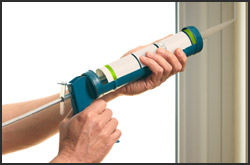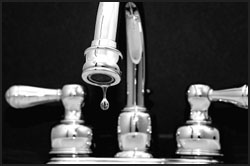Conservation
Conservation is a win-win strategy. By using less, you ease the stress on precious natural resources like water and fossil fuel, and you save money by reducing resource usage. At Precision Air, we have high expectations for energy conservation, and we deliver solutions that drive consumption to new lows.
A great place to start your energy conservation campaign is with a home energy audit by Precision Air. We perform a thorough evaluation of your home using advanced diagnostic equipment and provide a written report that maps out your conservation options step-by-step.
Our standard heating and cooling installations often reduce fossil consumption by more than 30 percent.
To jump-start your energy conservation efforts, please call Precision Air today or send us an e-mail.
Conservation Tips
Here are some conservation tips to help you save electricity, use less fuel and reduce water consumption.
Saving on Electricity

- Unplug seldom-used appliances. They drain current even when idle.
- Unplug chargers for cell phones and other devices when they are not in use.
- Set computers to go into sleep and/or hibernate mode when they are inactive.
- Set your refrigerator temperature between 38° and 42° and freezer between 0° and 5°.
- Run your dishwasher only when it is full, and use short cycles unless the dishes are exceptionally dirty.
- Dry clothes on a clothesline when possible. When using a dryer, clean the lint screen after each load.
- Use compact fluorescent lights. They last up to 10-13 times longer than standard bulbs and use 75% less energy.
- Use less water and use cooler water when doing laundry. The warm or cold water setting on your machine will generally do a good job of cleaning your clothes. Switching your temperature setting from hot to warm can cut a load's energy use in half.
- Install ceiling fans. They could cut your energy bill by 40 percent. And reversing fans for upward airflow will move warm air down in winter.
- Install dimmer switches. In addition to making for more romantic dinners, they'll extend the life of your bulbs and help you save up to 60 percent on lighting costs.
- Install motion-activated switches that automatically turn lights on and off.
- Use task lighting to target work and leisure activities. This lets you reduce your overall room lighting levels.
Reducing Fuel Consumption

- Upgrade to ENERGY STAR® energy-efficient heating equipment, which can save 10 to 40 percent on energy bills and may also improve the comfort level in your home.
- Use kitchen, bath, and other ventilating fans wisely. In just one hour, these fans can pull out a houseful of warmed or cooled air. Turn fans off as soon as they have done the job.
- Let the sun shine. Windows on the south side of the house get the most sunlight. Eastern windows get sunlight in the morning. West facing windows receive sunlight in the afternoon. Open shades and drapes during the daytime and close when the sun goes out.
- Remove or cover air conditioning window units.
- Correct air leaks around windows, doors and electrical outlets.
- Repair weather stripping and caulking.
- Insulate long runs of hot-water supply pipe, especially sections that pass through unheated spaces.
- Check your threshold for any gaps between it and the door. Use a bottom seal that can be attached to the bottom of the door. It should brush up against the floor to seal up the threshold. It virtually stops drafts.
- Turn your thermostat back when not at home. By turning your thermostat back 10° to 15° for 8 hours, you can save about 5% to 15% a year on your heating bill - a savings of as much as 1% for each degree if the setback period is eight hours long.
- Install an automatic setback or programmable thermostat, which, when used properly, can shave $100 off your annual energy bills.
- Make sure rugs and furniture don't block the air circulation from baseboard outlets.
- Replace any cracked glass in your windows.
- Seal off your attic circulating fan with polyethylene and tape.
- Make sure your home has enough insulation. The U.S. ENERGY STAR program recommends attic insulation of R38 to R60 and wall insulation of R5 to R6 in New Jersey. ("R" values are generally listed on the insulation packaging.)
- Install a water heater blanket for greater heating efficiency.
- Have your heating system tuned. A well-tuned boiler or furnace burns 5 percent less fuel.
- If you have a furnace, clean or replace the air filter once a month to assure the best airflow and efficiency.
- Make sure that furniture or draperies do not block heating vents.
- Keep ductwork in good repair with duct tape or duct insulation. Your home could be losing up to 25% of its hot air before it reaches the vents!
- Re-glaze window glass (glazing is the putty that seals the glass to the frame). You can use a putty knife or glazing gun. Re-glazing stops air infiltration on the sash (window frame) itself. You can then install a V-strip to stop any leaking that would go around the sash. This also makes the window easier to operate up and down.
- Close off rooms you don't use and shut the heating/air conditioning vents inside.
- Lower the temperature of your water heater from 140° (medium) to 120° (low). You'll save 3 to 5 percent in water heating costs for each 10° reduction.
Conserving Water

- Install water-conserving fixtures, such as showerheads, faucets and toilets. If your shower fills a one-gallon bucket in less than 20 seconds, replace the showerhead with a water-efficient model.
- Fix leaky faucets, especially hot water faucets.
- Take showers instead of baths. A five-minute shower will use about 7.5 gallons of hot water; filling a bathtub can use up to 20 gallons.
- Wash only full loads in your dishwasher, using short cycles for all but the dirtiest dishes. This saves water and the energy used to pump and heat it. Air-drying, if you have the time, can also reduce energy use.
- In your clothes washer, set the appropriate water level for the size of the load; wash in cold water when practical, and always rinse in cold.
- Turn off the faucet while brushing your teeth.
- Adjust lawn sprinklers so only your lawn is watered and not the house, sidewalk, or street.
- Install covers on pools and spas and check for leaks around your pumps.
- For cold drinks keep a pitcher of water in the refrigerator instead of running the tap. This way, every drop goes down your throat and not the drain.
- Wash your fruits and vegetables in a pan of water instead of running water from the tap.
Subscribe to Our Mailing List
Receive the latest news and promotions from Precision Air, Inc.










